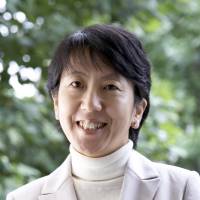My day job is at Chuo University in western Tokyo, and January at Japanese universities is chaotic, what with final classes, reports and grading as our second term comes to an end and the academic year winds down toward its conclusion in March. Among the words that come to mind, "happiness" is not usually one of them.
This month however, happiness and altruism have been in my thoughts — and that's quite a combination.
Last week at the end of a final lecture in a course titled Global Environmental Governance, I mentioned an op-ed piece by a Frenchman named Matthieu Ricard that appeared in The Japan Times on Jan. 16, titled "Altruistic cooperation key to solving global issues."
"As mankind now tries to solve new, global challenges, we must also find new ways to cooperate. The basis for this cooperation must be altruism," wrote Ricard — an opinion I paraphrased for the students.
I expected sounds of surprise, agreement or dismissal, but there were none. The only discernible response that came from around the room was muffled, nervous laughter.
Perhaps this was just too great a leap from the shortcomings of the United Nations system and concepts of realism and liberalism — or maybe the students were afraid that they had missed a key point sometime during the semester.
In any case, the closing minutes of the last class were not sufficient to do Ricard justice. But the moment got me thinking about how to introduce the concept of altruism in future courses, particularly because I think Ricard raised some important points to consider with regard to global environmental challenges.
"Nowhere is the need to cultivate this recognition clearer than it is in our economic system," Ricard, a Buddhist monk who lives in Nepal, declared.
"The unrealistic pursuit of endless quantitative growth places intolerable strains on our planet and widens inequalities. But reversing that growth would create other problems; forcing people to compete for diminishing assets and resources would spread unemployment, poverty, and even violence."
Unfortunately, altruism is not top of the heap of human traits. At best it may come in a distant fourth after greed, anger and ignorance. Still, I suspect it is part of our genetic makeup on some level.
As Ricard notes, "Research over the past 30 years indicates that true altruism does exist and can extend beyond kin and community to encompass the welfare of humans generally — and also that of other species."
Certainly, all those I know who have children of their own care deeply about the future of those kids and their offspring. But to hope that altruism will naturally guide decision-making is folly, unless we make efforts to identify and nurture it among the young.
In his op-ed contribution, Ricard raised another important point as well. He noted that we humans "consider our happiness over the course of a lifetime, while our concern for the environment will mainly benefit future generations."
Thus environmental conservation efforts must create options that link our desire for happiness now with our altruistic aspirations for future generations. That way, we will make choices today for ourselves that benefit others tomorrow.
For more ideas on this I turned to the website of the Institute for Studies in Happiness, Economy and Society founded by Junko Edahiro, one of Japan's most energetic and proactive environmentalists.
In the past I have interviewed Edahiro regarding Japan's energy policies (she has sat on several government energy-advisory committees), but we had never talked about her work linking happiness, society and environmental concerns.
By email, Edahiro explained that ISHES is a "virtual" institute with a two-fold purpose.
First, it is an effort to make clear that humanity faces "a dilemma of economic growth" that is the fundamental cause of the problems and obstacles we now face regarding societal sustainability and wellbeing. Because nobody has a perfect solution for these problems, "We all have to think, discuss and reflect in order to create societies in which we would like to live," she said.
The second goal of ISHES, its founder explained, is "to encourage and facilitate reflection on what matters in society, and to create space for dialogues among those who have different values and opinions."
ISHES came about at a particularly prophetic time, just two months before the Great East Japan Earthquake and tsunami on March 11, 2011, and the ongoing nuclear disaster that ensued.
Looking back, Edahiro said, "3/11 and the subsequent energy situation in Japan have reconfirmed the importance of the thinking behind ISHES, and people have looked to ISHES for information, insights and guidance to reconstruct their worldviews."
In the years before she became known globally as an environment advocate, Edahiro was a counselor and translator. Later, after working on environmental issues for more than a decade, she realized that society must tackle the fundamental structures that produce the environmental problems we face if we are to bring about necessary changes.
"From my experiences of studying and working as a counselor at the University of Tokyo's graduate school, I have a good sense of the interconnectedness of issues, which are usually viewed separately from each other — such as environmental issues, societal problems and personal mental issues," she explained.
"This is why I decided to start ISHES, to study and disseminate findings and lessons on the fundamental structure of our economy, society and well-being."
The ISHES website is bilingual and includes stories of unique local initiatives from across Japan, as well as many informative and mentally refreshing interviews with thinkers and policymakers from around the world. There is also a provocative explanation of "the dilemma of economic growth," and news of happiness studies from beyond Japan.
Edahiro works with a small staff and a large team of volunteer researchers and translators who between them keep the ISHES websites up to date. She is also chief executive of Japan for Sustainability, which maintains a separate bilingual website.
She and her websites have an enthusiastic following abroad, and Edahiro will be giving a paper titled "Resilience and Sustainability in Japan: Lessons from 3/11" at the International Conference on Resilience to be held in the southern French city of Montpellier in May.
As for well-being in Japan, at the moment happiness is getting a mixed reception.
"There have been many initiatives, in particular at the local level," Edahiro pointed out, but on the national level leaders and citizens are preoccupied with economic growth.
"Happiness is not a focus of this administration. For example, a national happiness survey was proposed and questionnaires were prepared under the previous administration, but that was abandoned after the current administration of Prime Minister Shinzo Abe came to power," she noted.
"Japan is a 'population-shrinking country,' and when we think of happiness or wellbeing, it is essential to tackle this aspect," Edahiro urged. "It is still difficult to talk about 'no economic growth' or a 'shrinking economy,' but it is much clearer now, with people having started to talk openly at the local level about Japan's shrinking population and strategies to make a soft landing."
And I'm pleased to say that all this has given me some ideas for the future on introducing students to issues of altruism and global governance — beginning with a look at governing their own nation for their own future.
For a fresh look at public policies and civil society in Japan, check out ISHES and JFS, whose websites are at, respectively, http://ishes.org/en/ and www.japanfs.org/en/. Stephen Hesse is a professor in the law faculty of Chuo University and is associate director of Chuo International Center. He can be reached at [email protected].


















With your current subscription plan you can comment on stories. However, before writing your first comment, please create a display name in the Profile section of your subscriber account page.